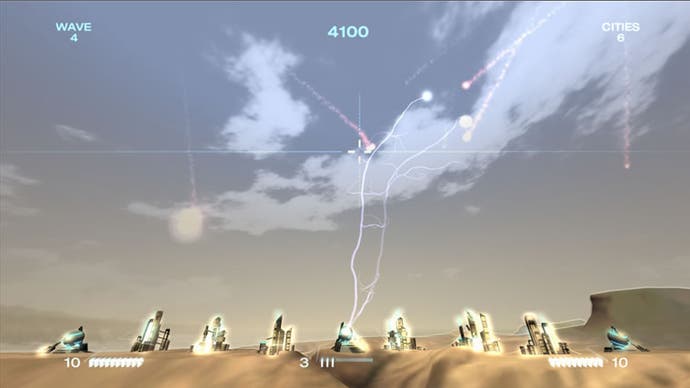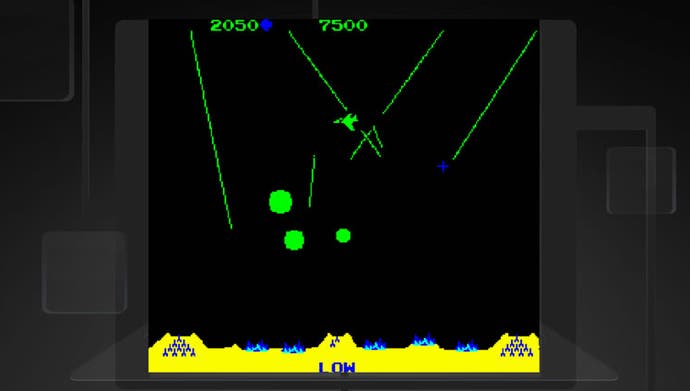Missile Command
No Cities Left.
On its own terms, the idea of a standalone Missile Command re-issue over Live hardly sounds like something to get excited about. It may well have entered the arcade Hall of Rose Tinted Fame about nine hundred years ago, but unless you were there at the time (man) it's hard to convey to anyone under the age of 28 exactly what the fuss was about. But isn't that always the case with early '80s retro offerings? Frankly, sod them if they're too young to get it. There's enough of us out there who do, and Microsoft knows it.
What's interesting about this particular offering isn't so much the original version (any retro gamer worth their salt will have MAMEd it to death, or bought it via a compilation, surely?), but the other parts of this deceptive little package. Ported and redeveloped by Stainless, the UK developer has done for Missile Command what it did a couple of months ago with Centipede, and it demented brother Millipede. If you gave it a spin, you might have been mildly impressed with the sympathetic, squelchy graphical makeover, and the absolutely insane Throttle Monkey mode which somehow made playing it at high speed more fun than it had any right to be. It's the same deal with Missile Command. Nothing fundamental has changed, as such, but a few well placed tweaks have turned Atari's 1980 shooter into a fun diversion that's worth a few quid for the retro obsessed - just.
In case you've somehow managed to avoid playing it at any point in gaming's rich history (in which case, have a Star Bar, followed by a banana), it's not your typical single screen shooter; i.e. it's not another tedious twist on Space Invaders. For a start, the game originally used a trackball in its arcade form, lending the cross-hair shooting antics the kind of furious analogue precision that was practically unheard of at the time.
Hate then Love

The idea was to protect the planet Zardon (the letter Z was still a requirement for all things alien in 1980) from incoming missiles hurtling towards its six major cities. With three missile batteries under your control, the player has the ability to fire ten missiles from each by pressing the appropriate fire button. Destroying incoming projectiles was simply a case of moving the cross-hair around the screen and firing from either the left, centre or right as required. Getting a shot on target was a case of judging the approximate speed, angle and blast radius of your counter-missile (in the case of the Evolved version, a bolt of lightning). Missing wasn't really an option after the first few waves, because by the time you'd reacted, the speeding enemy missile would have streaked inexorably towards one of your precious cities.
Even now, it's an incredibly tense and remarkably precise shooter that's quite unlike anything around at the time. Although it was widely cloned, it wasn't a game that ever got a true sequel (despite a few prototypes kicking around), and these unusual factors have undoubtedly helped retain its special appeal. With the usual online leaderboards taking the MAME/compilation argument out of the equation, there's plenty of incentive for the true hardcore old school to dust off their skills - in fact, each leaderboard also caters for the various difficulty levels of each mode if you're truly obsessed with oneupmanship. Achievements, too, are worthy of the name for once, with a wealth of tough to manage tasks for those of you with reservoirs of patience and a contempt for new games.
For the more casually aligned retro gamer, though, what's more interesting is how the Evolved version actually plays, and whether the Throttle Monkey mode is as amusing and strangely compelling as it was in Centipede. In terms of gameplay, your first instinct is to pine for a more precise control system than a joypad can offer. It's a game crying out to be played on a mouse, and as a result it does take a while to adjust to moving around the crosshair with the left stick.
That said, the Evolved controls feel slightly tweaked for the better, and after an initial learning curve you'll start to get into it more than seems possible. Compared to the arcade original, it does appear to offer a little more inertia when moving the crosshairs, which helps when making the fine adjustments you need when things get crazy. What it doesn't do, though, is let you streak from one side of the screen to the other, and therefore it's a lot tougher once the game starts dishing out the pain. Throttle Monkey mode, as a result, is pretty bloody tough, but it's still a lot of fun once you start getting good at the main game. Returning to this super speeded up mode with your newfound confidence is hilariously challenging, giving you the chance to squeeze in no end of quick high score attempts in your lunch hour thanks to the near impossibility of surviving much longer than a minute or so.

Gang of Losers
As for the inevitable graphical makeover, it thankfully doesn't make you want to spoon your eyes out. UK dev Stainless has handled the task with a pleasing amount of subtlety, conjuring a look and feel that suits the premise perfectly, just as it did for Centipede. For example, the way each wave takes place in different atmospheric and lighting conditions gives what was a hugely bland looking game a much needed degree of ambient variety. You might, gasp, prefer what the Evolved version offers - and if you don't, that says a lot about your eyes...
Less thrilling is the tinny, repetitive formulaic electronica that provides the audio backdrop, or the lack of any multiplayer options whatsoever. Likewise, it eventually suffers from being a typical one-note 1980 arcade game where playing for the high score is pretty much the only reason to devote time to it beyond the first hour or so. Suffice to say, if you haven't got any friends involved in that classic battle for leaderboard pride, it might not be the game for you. Like so many games of this ilk, though, competition could transform your enjoyment of it - but that ought to go without saying.
Missile Command, like so many of the retro offerings on Xbox Live Arcade is very much 'one for the fans', Most of you will already know whether you're going to buy it or not, and the rest of you will be happy to satisfy your retro urges via the ubiquitous free trial. Cheap, cheerful, timeless fun, and ultimately short-lived - but isn't that the whole point?

